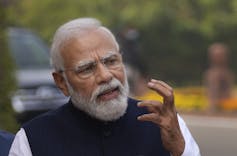
Max Weber, the founder of modern sociology, once argued that charismatic politicians are seen by their followers as saviours and heroes.
But they are just as likely to be charlatans and swindlers.
Whether you blame social media or inequality, contemporary citizens seem to want political horse races and big personalities — at least that’s the conventional wisdom. Engage your disgruntled followers with big ideas on TikTok!
It would be bad enough if culture war clashes were just so much entertainment. But politicians that include former British prime minister Boris Johnson in the U.K. and American Sen. Josh Hawley appeal to the working classes — the masses of people without much money who turn out to vote.
Their alpha male leadership styles are built on audacious attacks on the legitimacy of free, open and equitable societies.
Read more: Why hard-core Trump supporters ignore his lies
The public watches in amazement as these leaders espouse terrible beliefs about immigrants, refugees and sexual minorities that only bigots used to say in private.
As we examine in our book Has Populism Won? The War On Liberal Democracy, these populist shock-and-awe tactics are a brazen attempt to personalize authority under the cliché of “power to the people.” They also cause citizens to lose sight of what’s important as they bicker over the newest scandal.
Conspiracy theories, lies
Polarization is not a side effect of populism, but rather its mainspring.
Populists know that in highly polarized societies, a photo finish is still a win. So candidates fight like hell, using every tool at their disposal to win — conspiracy theories, outright lies and of course, obscene amounts of money.
Disenchanted voters support populists because conservatives have thrown off the shackles of modern political messaging. Extremism cuts through the noise of the news cycle and connects with the base.
Pierre Poilievre, Canada’s newly elected Conservative leader, is an example. He’s riding the wave of the so-called Freedom Convoy, anti-vaxxers and the far-right wing of his party and following the template that has worked so well for populist governments across the globe.
But his free speech persona, like every other authoritarian, is carefully constructed.
Italy’s Giorgia Meloni is an instructive example of this careful construction.
Voters were seduced by her charisma. That’s because the crucial element in creating a a popular far-right movement is constantly reminding citizens that they are the tribe of the true nation — and Meloni has mastered the discipline of a communications maestro.
Collective wrath is a proxy for belonging to the tribe and that feeling of belonging became the basis for her authoritarian fantasy of the popular will.
Anger is a prime motivator
Despite his defeat, voters turned out in large numbers to vote for Donald Trump in 2020 and barely rejected Brazil’s Jair Bolsonaro in 2022.
Do high-profile losses mean the worst is over? No, because the contempt for democracy at the heart of populism has not yet been defeated. Today populism is still growing, metastasizing and reaching into every corner of modern politics. It is coming from many directions at once.
At first it was easy to write off populism’s appeal to ignorance. Now the key elements radicalizing voters are crystal-clear: anger against hyper-globalization, a reserve army of economic losers, ideological true believers, charismatic leaders weaponizing the big lie and the ultimate prize, money and organization to win the commanding heights of political office.
Read more: The 'freedom convoy' protesters are a textbook case of 'aggrieved entitlement'
Social psychologists have shown that anger is a prime motivator in politics. In times of peril, the most vulnerable pin their hopes on the authoritarian leader with emotionally charged messaging and grandiose promises.

Of course, the anger is a distraction from the true work of the populist — disinformation. In a post-truth age, the populist is a narcissist like India’s Narendra Modi, who uses sly innuendo and outright chicanery to consolidate power.
Many reasonable people in advanced democracies tolerate populist temper tantrums because anger and bullshit are better than apathy, aren’t they?
Read more: Bullshit is everywhere. Here's how to deal with it at work
Populist turmoil, however, can’t be measured in units of patriotism. Patriotism requires genuine care for one’s country and all the people in it.
In the hands of masters of manipulation, anger coarsens discourse, diminishes the possibility of compromise and normalizes extreme rhetoric. Even so, anger in politics isn’t always a power move.
Outrage can motivate people to speak up and utter uncomfortable truths. Compassionate anger can be a powerful force for justice, as we witnessed in the Black Lives Matter movement. How can we tell the difference between rage farming and righteous anger? It’s difficult but doable.

The cynicism of contempt
The difference between political success and failure in such a polarized society is always a matter of voter turnout.
In the United States, the Republicans bet that dialling up the anger to an 11 would squeeze a few more votes from an exhausted electorate, but they didn’t deliver a red tsunami — this time.
Is it fair to decry the normalization of strong emotions in politics as a conservative problem? Don’t both sides use intense feeling for political gain? They do.
Emotional messaging is too potent a tool in modern democracy to be ignored by any party that wants to win power. But today, conservatives lean hard on strong negative emotions and eschew hope — and their outrage too often carries a distinct threat of vindictive violence.
When analyzing affective political messaging, we always need to figure out if the anger we’re witnessing is calculated to prolong endless wars of polarization or whether it seeks to reconcile division and rebuild community.

For example, Black mothers in Memphis are demanding the police stop killing their sons. Their demands are grounded in reality, and more than anything else they want a future of peace and safety for their children.
Today populism is defined by rhetorical violence and the authoritarian supposed strongmen. Democracies die and civil wars start with right-wing leaders who use their anger to degrade democracy and tighten their grip on power.
Make no mistake. We are far beyond the stop-gap measures of small-step reform or pragmatic centrist liberalism. What lies beyond the careful compromises of the post-Second World War order? We’re about to find out.
The authors do not work for, consult, own shares in or receive funding from any company or organisation that would benefit from this article, and have disclosed no relevant affiliations beyond their academic appointment.
This article was originally published on The Conversation. Read the original article.







